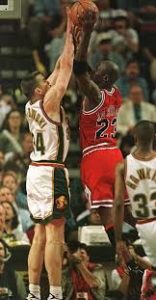When the NCAA tourney got canceled in March we entered a whole new world, which included a sports void the likes of which we have never seen before. The fine folks at ESPN came to the rescue in mid-April with “The Last Dance”, a 10-part miniseries about the 1998 Chicago Bulls and their quest to win a 6th NBA title in an 8-year span before Coach Phil Jackson and most of his star players all went their separate ways. While it has been comforting to spend the past several Sunday nights with behind-the-scenes stories from Steve Kerr/Scottie Pippen/Dennis Rodman, the star of the show as always is Michael Jordan. Even though the documentary concluded on May 17th, HoopsHD’s Jon Teitel has dug through his archives and discovered oodles of unpublished interviews about Jordan’s career, from his early days as the leading scorer for team USA at the 1983 Pan Am Games to a 55-PT playoff performance during Chicago’s final title run in 1998. We continue our trip down memory lane by chatting with Frank Brickowski about playing for Bulls assistant Johnny Bach during college and facing the Bulls in the 1996 NBA Finals as a player with Seattle.
Your 2 college coaches at Penn State (Johnny Bach, who won 3 rings with the Bulls from 1991-1993, and Dick Harter) were both known for their emphasis on defense: what made them such great coaches, and what is the key to being a great defensive team? Bach was old school and a brilliant strategist who had a great career in the NBA working with Phil Jackson. Harter was really aggressive and he slowed the ball down so that our opponents would have problems scoring.
What are your memories of the 1980 NIT (you had 16 PTS/17 REB in a 4-PT loss to Alabama)? We were nervous but had a great experience. I had a good game but we did not play well as a team.
You were a 79% FT shooter in college, but your FT% actually decreased during each of your 4 seasons (from 84% as a freshman to 77.8% as a senior): how did that happen, and why do you think it is so hard for most big men to make FTs? I have no idea why my percentage went down but it did not concern me because I still made most of them. Big men just do not practice FT shooting enough in today’s game: it is a lost art.
In the summer of 1981 you were drafted in the 3rd round by the Knicks but you went abroad for a few years to play in Italy/France/Israel: what did you learn from the experience, and how did pro ball overseas compare to the NBA? I learned that I loved traveling/learning about different cultures. My mom was born in France so I enjoyed it there a lot. The level of play does not compare to the NBA but it helped me get my feet wet. You have to produce or you will not have a job.
In 1984 you returned to the NBA with the Sonics: why did you decide to return, and why did you go to Seattle? The NBA is where I always wanted to be…and the Sonics were the 1st team to guarantee me money. Lenny Wilkens was a great coach.
As a member of the Spurs in 1990 you had a 3-PT OT loss to Portland in Game 7 of the Western Conference Semifinals after Terry Porter scored 36 PTS and stole an inbounds pass with 5 seconds left: how great was Porter in that game, and how devastating was that loss for your team? David Robinson was a rookie. Terry is a good friend of mine and was a great player. Rod Strickland made a good pass at the end of the game but Sean Elliot was a rookie and kind of froze. I think that Rod unfairly took a lot of blame for that. It hurts any time that you lose Game 7.
After making only 16 threes during your 1st 10 years in the NBA you made 32-79 from behind the arc (40.5%) during the 1995-96 season: how were you able to incorporate the 3-PT shot into your arsenal at age 36, and did you regret not doing so a decade earlier? I was not asked to shoot threes earlier in my career. It was more out of necessity late in my career and it helped open the floor for everyone else.
In the 1996 NBA Finals against Chicago you and Dennis Rodman (who grabbed an NBA Finals-record-tying 11 offensive REB in Game 2 and another 11 in Game 6) each picked up several technical/flagrant fouls for your physical play: what was it like to play against Rodman, and where does that 72-10 Bulls team rank among the best you have ever seen? Rodman was a brilliant rebounder but there was no “physical play”: he just flopped and the refs kept calling fouls! That Bulls team was 1 of the best ever but it is hard to compare them to the Lakers/Celtics teams of the past.
You averaged 10 PPG/4.7 RPG during your 12-year career, and your 51.9 FG% remains in the top-75 all-time: how satisfied are you with your career, and what is the secret to being a good shooter? I am thrilled with my career, and appreciate it the longer I am away from it. They key to shooting is just practicing and having a sound form. If you shoot day in and day out, it will give you a lot of confidence.
You currently work for the National Basketball Players Association: what do you do for them, and what do you hope to do in the future? I am the West Coast rep and I help out with education to save players from getting into real trouble. We see it making a difference so the future plan is just to keep supporting the players.

